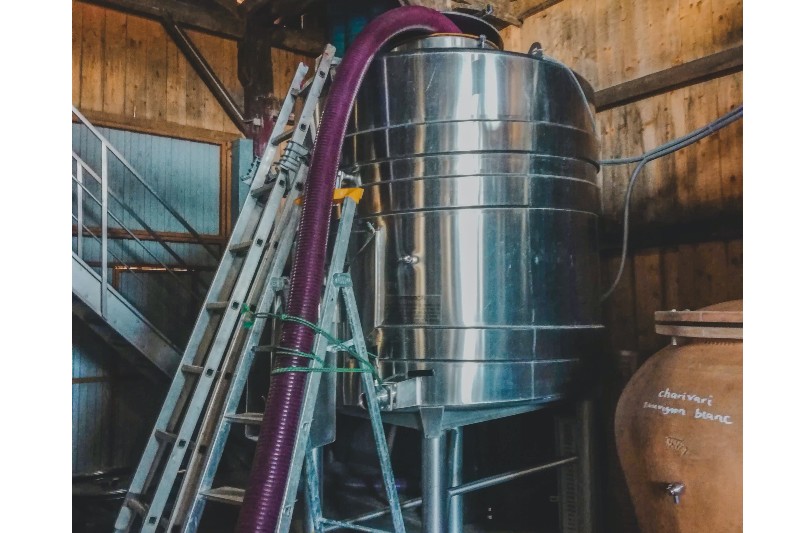Whether you love red, white, or rosé, a glass of wine with dinner can be a nice way to enjoy a meal, but if your plate is deliberately devoid of animal products, you may be surprised to learn that your favorite glass of wine is actually not vegan. It’s true, although we tend to think of meat, poultry, eggs, dairy, fish, and even honey as being taboo for vegans, most conventional wines belong on that list as well as they contain animal byproducts.
The good news is that there are some great vegan wines these days, and if you’re following a vegan diet or simply interested in doing the best you can for your health and the environment, you may want to consider switching over to vegan wines. Not sure why you’d want to drink vegan wine? Keep reading to learn about the benefits of vegan wine and why making a choice to sip vegan wine may be important to you.
Why is Most Wine Not Vegan?

If it’s never even crossed your mind that wine may not be vegan, you’re certainly not alone. While the primary ingredients (grape juice and yeast) in wine are inherently vegan, the winemaking process typically includes something called a fining agent, which is usually animal-based. While wine is left to sit to ferment, sediment forms within the vats. Unless winemakers are willing to give ample time for the sediment to fully settle while the wine sits (which slows production and thus profits), they use fining agents to attract the sediment and pull it out of the wine. The fining agents are sticky and attract the sediment particles, allowing them to be easily and quickly filtered out, leaving a smooth, clear wine in much less time than allowing the process to occur on its natural timetable.
Essentially, fining agents help hasten the process of getting the wine from the barrel to the bottle so that the next batch can start fermenting. Most fining agents are made with animal-derived ingredients like isinglass from fish bladders, gelatin from hooves, casein from dairy, and albumin from egg whites, all of which are not permitted in the vegan diet. Even though the final filtering process of wine removes most of the fining agents, some of the agents may remain in the wine, and because the industry behind the manufacturing of animal-derived fining agents exploits animals, many vegans make conscious choices to avoid any non-vegan wine.
What is Vegan Wine?
Vegan wines do not use animal-based fining agents to pull out particulates during the winemaking process. Instead, winemakers use vegan fining agents (like bentonite clay or silica) or give the wine ample time to settle, negating the need for fining agents altogether. Vegan wines, therefore, are free from animal products and are made without exploiting animals.
Benefits of Vegan Wine

Besides the obvious benefit of being permissible for vegans, vegan wine has several benefits, including the following:
Vegan Wines Often Have Fewer Chemicals
Although not an absolute given, the majority of vegan wines are also organic, which means the grapes are grown without chemical-laden herbicides and pesticides, and the wine is free from chemicals, and artificial colors and ingredients. Organic wines have no synthetic ingredients or chemicals used in the filtering or bottling process either. Pesticides, herbicides, and certain synthetic ingredients that may be used in wines that are not organic have been linked to adverse health consequences. Since most vegan wines are organic, you can feel confident you’re keeping these toxins out of your body by drinking a much cleaner, healthier, and more natural product.
Vegan Wines May Have More Antioxidants
When people talk about the health benefits of drinking wine, they are usually referring to the resveratrol in red wine. Resveratrol is a potent antioxidant known to reduce the risk of cancer, heart disease, and inflammation while also conferring anti-aging effects and longevity benefits for your body. Vegan red wines tend to be significantly higher in resveratrol because they are almost always organic, and organic wines are said to have about 32% more resveratrol than comparable non-organic wines.
Vegan Wines May Be Lower in Sulfites
While all wines contain sulfites, vegan wine tends to be lower in sulfites because they are not added to enhance the preservation process. Sulfites are compounds that are produced as a natural byproduct of fermentation, which is why all wine has at least a baseline level of sulfites. However, many winemakers often add additional sulfites to preserve the freshness of the wine, keep it from oxidizing, and protect it from unwanted bacteria and fungi. Some people are allergic or sensitive to sulfites and may get headaches, joint pain, and inflammation after drinking wine with a higher concentration of sulfites.
Vegan Wines are Better for the Environment
Many people are drawn to the vegan lifestyle not just for the health benefits, but also for the environmental benefits. For example, a plant-based diet has a much smaller carbon footprint because fewer greenhouse gas emissions are produced through the cultivation of plant-based foods compared to raising livestock, poultry, and dairy. Water is also conserved relative to the amount of water necessary to produce animal-based foods.
There are positive environmental ramifications of choosing vegan wine. Because vegan wine is usually organic, no chemicals are used in the production of the wine or released into the environment. The result is significantly less disruption to the ecosystem and soil.
Vegan Wines are Cruelty-Free
The animal-farming industry is fraught with cruel practices, and the animals from which conventional wine fining agents are sourced are no exception. The egg whites are typically from chickens that have been caged their whole lives, and the fish bladders come from fish that have lived on top of one another in farms, for example. Choosing vegan wines shows you support animal rights and welfare since no animals are used or harmed in any step of the process.
Vegan Wines May Taste Better
Because vegan wines are usually organic and devoid of additives, preservatives, and artificial ingredients, they usually taste richer, more vibrant, and fresher than regular wine.



